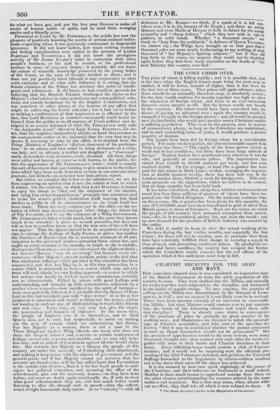THE CORN CRISIS OVER.
THE price of wheat is falling rapidly ; and it is possible that, just at the time when the English fitrmer must bring the next crop to market, it will be lower, instead of higher, than it has been for the last two or three years. That prices will again advance, unless there should be an unusually abundant crop, is absolutely certain ; fbr the duty would continue for months together too high to allow the admission of foreign wheat, and there is an ever-increasing demand—more mouths to fill. But the firmer would not benefit by the reaction. His wheat would have been converted into the means of paying an advanced rent ; again the country would he compelled to apply to the fbreign grower ; and all would be pinched save time landlords, who would pass another merry Christmas amidst a suffering population. This must be the process, save in seasons of extraordinary plenty, as long as the Corn-laws are maintained; and in each succeeding series of years, it would produce a greater quantity of distress.
The people have been fed by foreign wheat for a considerable period. For many weeks together, the almost invariable report from Mark Lane has been—" The supply of the home-grown article is small and in bad condition ; but there have been large arrivals of foreign." English dealers have purchased coin wherever it was for sale, and generally at enormous prices. The importation has varied front 15,000 to :30,000 quarters per week, and has even reached 55,000. On the average, at least 708. a quarter has been paid for this wheat in Mark Lane ; so that, averaging the importa- tion at 20,000 quarters weekly, there has been laid out, in the London market alone, 70,000/. a week for foreign corn. This esti- mate proceeds on the supposition, which we believe to be correct, that no large quantity has been held back. It has been calculated, that, altogether, within a twelvemonth not
much less than three millions of quarters of vheat have been im- ported into the United Kingdom. On the moderate estimate that, on the average, 508. a quarter has been given for this quantity, the sum of 7,500,000/. must have been transferred in gold or silver from British purses to those of fbreigners. Such are the terms on which the people of this country have procured exemption from starve- tion,—fbr, be it remembered, plenty has not been the result ; and no new demand for the produce of British industry was created by the outlay.
We hold it useful to keep in view the actual working of the Corn-laws during the last twelve months, and especially the last winter ; for there will not be wanting men to proclaim that those laws have admirably fulfilled their design in securing a supply in time of need, and preventing exorbitant prices. By prodigious ex- ertioas and heavy sacrifices, the country has escaped the famine which the Corn-laws nearly caused ; but the evil effects of the operation which it has undergone must long be felt.


























 Previous page
Previous page